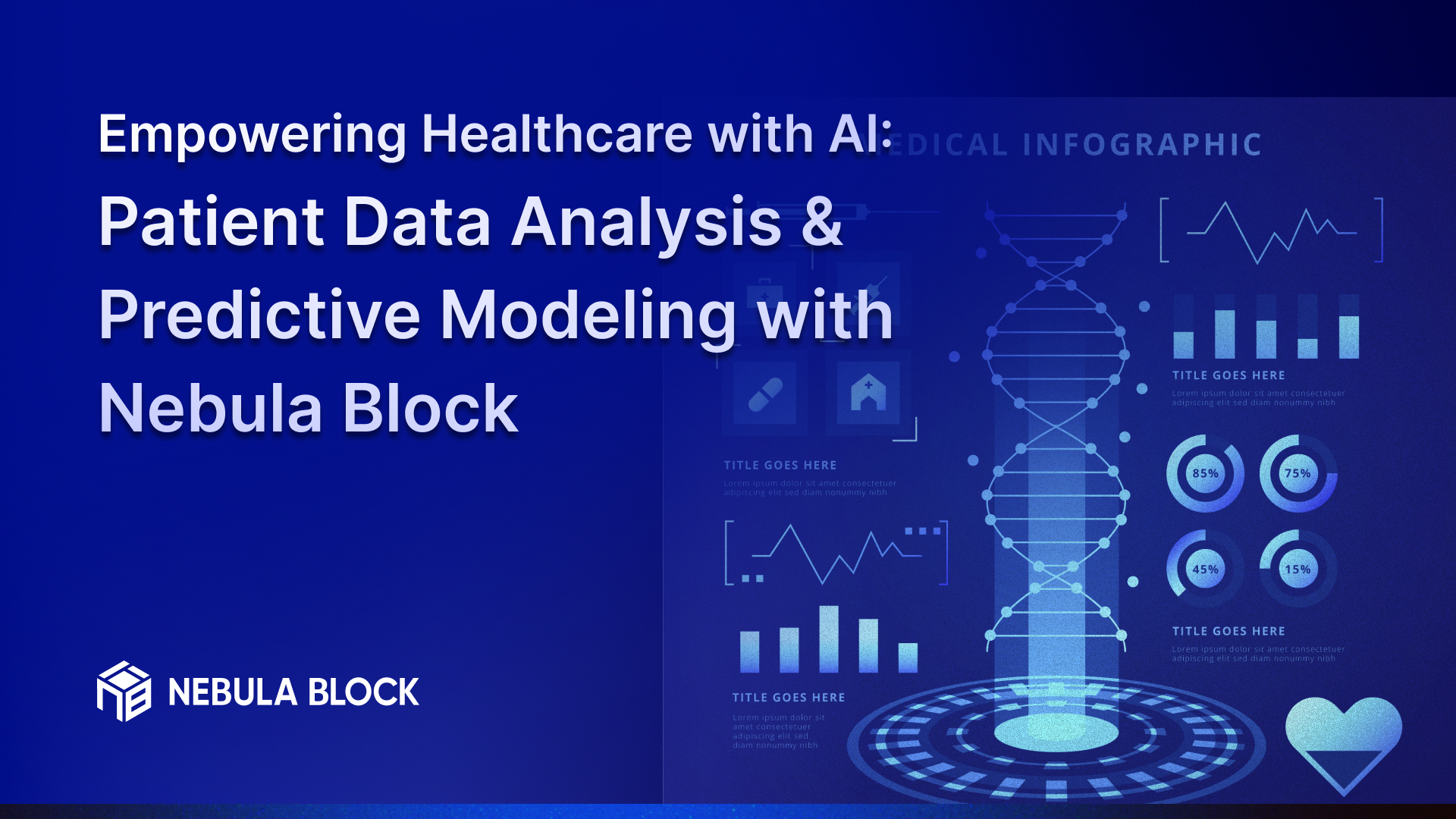Empowering Healthcare with AI: Patient Data Analysis & Predictive Modeling with Nebula Block

As the healthcare industry increasingly turns to technology for solutions, artificial intelligence (AI) is emerging as a game-changer. AI models can analyze vast amounts of patient data, improve diagnostics, and forecast health outcomes, offering healthcare professionals valuable insights for more effective decision-making.
At the core of this revolution is GPU computing and inference-optimized infrastructure, enabling healthcare AI to move from theory into practice.
The Challenge of Patient Data
Healthcare systems generate enormous volumes of data: electronic health records (EHRs), lab results, medical imaging, genetic sequencing, and even wearable device data. Traditionally, analyzing these diverse sources has been time-consuming and error-prone, often requiring manual review or rule-based systems.
AI models, particularly large language models (LLMs) and multimodal models, can bridge this gap by:
- Extracting patterns from unstructured text (doctor notes, reports).
- Assisting in the analysis of medical images to detect anomalies with high speed and consistency
- Correlating datasets (labs, imaging, lifestyle data) for holistic insights.
The Role of AI in Healthcare
1. Analyzing Patient Data
AI can integrate information from EHRs, lab results, imaging, and wearables to build a complete health profile.
- Personalized medicine: Tailored treatment plans based on genetics, lifestyle, and history.
- Clinical decision support: Automated alerts for drug interactions, anomalies, or recommended tests.
2. Supporting Diagnostics
- Image analysis: CNNs detect tumors, fractures, or anomalies in scans with high accuracy.
- NLP: Extracts insights from clinical notes to support better diagnoses.
3. Forecasting Health Outcomes
- Risk prediction: Identify patients likely to develop chronic conditions before symptoms appear.
- Resource planning: Predict admissions to optimize staffing and emergency response.
4. Virtual Health Assistants
- AI agents can handle patient queries, schedule follow-ups, or provide preliminary triage.
- Reduces the workload on medical staff while ensuring patients receive timely support and guidance.
5. Operational Optimization
- AI can optimize hospital logistics like bed management, supply chain, scheduling.
- Reduces costs and ensures resources are available by improving logistics.
6. Drug Discovery & Development
- Simulating molecular interactions at scale and identifying promising compounds more quickly than traditional lab processes.
- Shortens development cycles and lowers costs for bringing new treatments to market.

7. Medical Imaging Enhancement
- AI can enhance resolution, denoise, or reconstruct scans, improving speed and accuracy for clinicians.
- Allow clinicians to diagnose conditions faster and with greater confidence, especially in urgent cases.

8. Population Health & Epidemiology
- AI models can track disease spread across regions, model the potential impact of interventions, and support the creation of public health policies.
- Enables proactive responses to outbreaks and better long-term planning for population health management.
Investment Trends in Healthcare AI
Private investment in medical and healthcare AI has been growing steadily, highlighting the global push to integrate AI into diagnostics, patient care, and drug discovery.

This upward trend underlines why healthcare providers are actively adopting AI solutions—and why robust infrastructure like Nebula Block is critical to support these innovations.
Why GPUs and Inference Models Matter
All of this requires heavy computation. Training diagnostic models on medical imaging or running large-scale predictive analytics is extremely resource-intensive. GPUs enable parallel processing that is essential for:
- Training deep neural networks on millions of images or patient records.
- Real-time inference for diagnostic support tools in hospitals.
- Scaling predictive modeling to handle entire patient populations.
Inference-optimized models also make it possible to run predictions quickly and at lower cost — a crucial factor when deploying AI in clinical settings where latency and accuracy are critical.
How Nebula Block Supports Healthcare AI
To translate these AI capabilities into practice, healthcare organizations need an infrastructure that is both powerful and reliable. Nebula Block provides the foundation through:
- High-Performance GPUs: Accelerated training and inference for real-time use cases, quickly analyze large datasets.
- Scalable Infrastructure: On-demand or reserved instances adapt to daily workloads or emergency surges.
- Data Security & Sovereignty: Compliance-first with privacy laws, adhering to local regulations to keep patient data safe.
- Ready-to-Use AI Models: Provides access to AI models optimized for healthcare, enabling faster deployment of analytics, diagnostics, and predictive tools without lengthy setup.
Nebula Block has already proven its value in real-world healthcare scenarios. For instance, powering EbomedAI’s precision AI platform, which streamlined clinical workflows and improved diagnostic efficiency.
Ethical Considerations
While AI offers powerful tools for healthcare, it also raises important ethical questions. Ensuring transparency in algorithms, protecting patient privacy, and maintaining human oversight in clinical decisions are essential to building trust and accountability in AI-driven systems.
Looking Ahead
AI in healthcare is not just about futuristic scenarios, it is already helping clinicians improve accuracy, efficiency, and patient outcomes today. With scalable, secure, and high-performance infrastructure like Nebula Block, healthcare providers can unlock the full potential of AI, from intelligent agents that monitor patient data in real-time to advanced diagnostic tools that support clinical decision-making.
What’s Next?
Sign up and explore now.
🔍 Learn more: Visit our blog and documents for more insights or schedule a demo to optimize your search solutions.
📬 Get in touch: Join our Discord community for help or Contact Us.
Stay Connected
💻 Website: nebulablock.com
📖 Docs: docs.nebulablock.com
🐦 Twitter: @nebulablockdata
🐙 GitHub: Nebula-Block-Data
🎮 Discord: Join our Discord
✍️ Blog: Read our Blog
📚 Medium: Follow on Medium
🔗 LinkedIn: Connect on LinkedIn
▶️ YouTube: Subscribe on YouTube